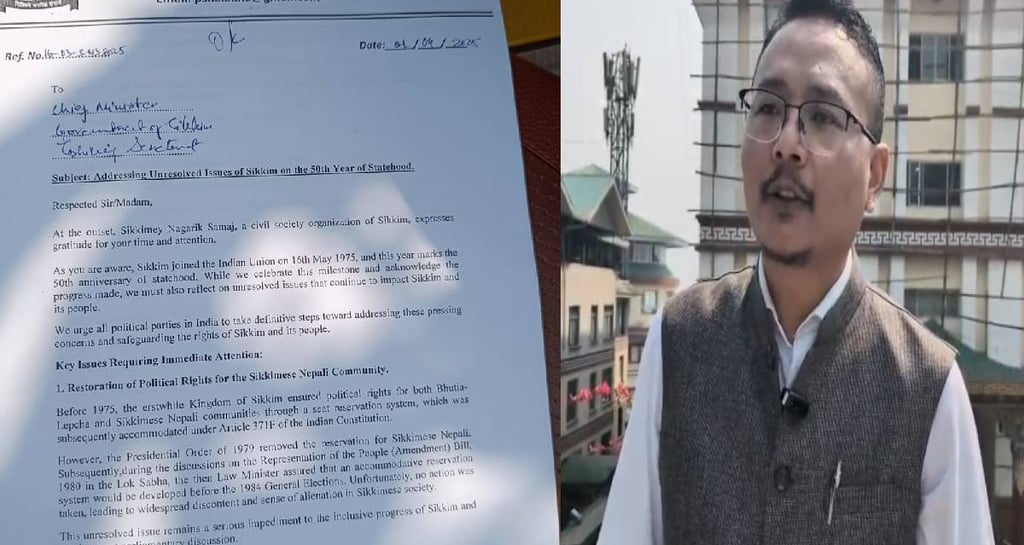Sikkim’s Civil Society demands immediate attention to long-pending issues ahead of 50th statehood anniversary
Sonam Gyatso Sherpa, the State Co-ordinator of Sikkimey Nagarik Samaj spoke about the importance of unity in addressing these issues.
LOCAL


As Sikkim prepares to celebrate the 50th anniversary of its statehood on May 16, 2025, the Sikkimey Nagarik Samaj, a prominent civil society organization, has issued a strong appeal to the government to address several unresolved issues that continue to affect the state and its people. In a letter addressed to key political leaders, the organization urged the Indian government to take immediate action to restore the political rights of the Sikkimese Nepali community, ensure rightful reservations for the Limboo and Tamang communities, and protect the state’s special status under Article 371F of the Indian Constitution.
The 50th year of Sikkim’s integration into the Indian Union is a momentous occasion, but it is also an opportunity to reflect on the progress made and the challenges that remain. The Sikkimey Nagarik Samaj has expressed deep concern over the political and socio-economic issues plaguing the state, urging all political parties to come together to address these pressing matters.
One of the key demands highlighted by the organization is the restoration of political rights for the Sikkimese Nepali community. Before Sikkim joined India in 1975, the state had a seat reservation system that ensured both Bhutia-Lepcha and Sikkimese Nepali communities were adequately represented. However, the Presidential Order of 1979 removed the reservation for Sikkimese Nepali, and despite assurances in 1980 that a new system would be put in place, no concrete steps have been taken. The Sikkimey Nagarik Samaj has urged the government to address this issue urgently to ensure the inclusivity of the Sikkimese society.
The Limboo and Tamang communities of Sikkim were granted Scheduled Tribe (ST) status in 2003, but despite Supreme Court rulings and 22 years of waiting, these communities still do not have their reserved seats in the Sikkim Legislative Assembly. This has led to growing frustration among these communities, and the Sikkimey Nagarik Samaj is calling for swift legislative action to rectify this constitutional injustice.
Article 371F was a crucial provision that ensured Sikkim’s special status within India at the time of its integration. However, various legal and policy changes over the years, such as the Representation of the People (Amendment) Act of 1980, the enforcement of the Income Tax Act of 1988, and the Finance Act of 2023, have weakened this status. The Sikkimey Nagarik Samaj has raised concerns that these actions have undermined the promises made to Sikkim at the time of its integration, and has called for a reaffirmation of the state’s distinct identity and special constitutional guarantees.
In addition to political concerns, the civil society group highlighted several socio-economic challenges faced by the state. These include economic distress, high suicide rates, declining fertility rates, rising mental health issues, and increasing substance abuse. The organization is particularly alarmed by the growing unemployment rates and the lack of a comprehensive plan to address these challenges. The group emphasized that neglecting these issues will continue to erode the social fabric of Sikkim and hinder its progress.
As the 50th anniversary of Sikkim’s statehood approaches, the Sikkimey Nagarik Samaj has made a heartfelt appeal to all political parties to set aside differences and work together for the betterment of Sikkim. The organization believes that if the state is to truly progress, it is essential that these long-standing issues be addressed without delay. They have also urged the government to consider the economic situation of Sikkim, particularly with respect to its budget and financial independence, and to ensure that Sikkimese people are given their rightful share of opportunities.
The organization has been actively engaging with various stakeholders, including the Chief Minister’s office and political representatives, to ensure that these demands are not sidelined. In a recent meeting with the Principal Secretary to the Chief Minister, Mr. Dhakal, the civil society group submitted a letter outlining their demands, which include the restoration of political rights, the reservation of seats for the Limboo and Tamang communities, and the safeguarding of Sikkim’s unique constitutional status.
Sonam Gyatso Sherpa, the State Co-ordinator of Sikkimey Nagarik Samaj spoke about the importance of unity in addressing these issues. He noted that, despite the challenges, the people of Sikkim must work together to achieve justice and ensure that future generations can benefit from the progress that is made today. He stressed that the government must show political will to restore the lost seats and resolve these long-standing issues.
As Sikkim celebrates its milestone anniversary next year, the Sikkimey Nagarik Samaj hopes that these critical issues will be given the attention they deserve. The organization has promised to continue its efforts in raising awareness and pressing for action, not only for the benefit of the current generation but for the future of Sikkim and its people.
